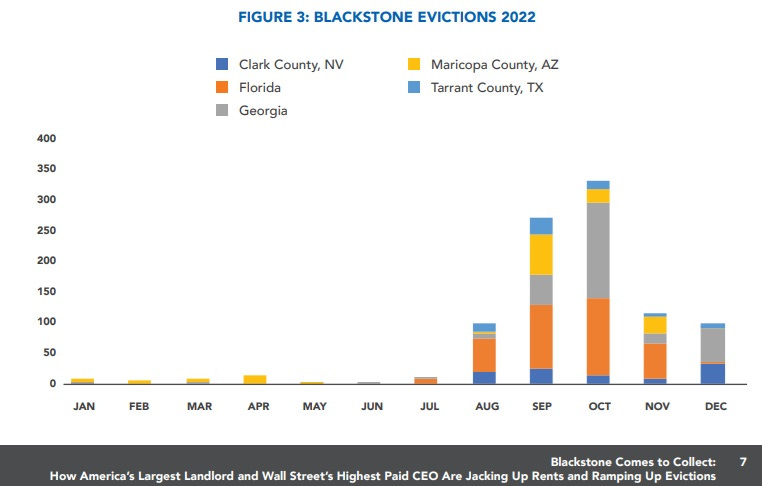Saturday Digest Vol. 4, Issue 1
Sifting through sources all week to deliver you real, interesting news. Curated by a professional journalist and delivered to your inbox every Saturday.
“I am a man — nothing human is foreign to me.” — Terence

The Worldview is back from its burnout-induced summer recess. The news cycle has churned relentlessly on in the meantime, and some of the topics covered below may already be familiar to you, if only in the form of having seen a recent headline.
All of the stories featured in this first issue of volume four are thematically linked by corporate greed and the economics of power.
On the international level, the United Nations’ landmark report about the global economic web upholding Israel’s apartheid system;
at the national level a 2023 report worth revisiting, about billionaire Steve Schwarzman and his company Blackstone “financializing” the housing market to generate extreme wealth at the expense of regular people;
at the local level, generations of Aquidneck Islanders rose up in protest amidst confirmed rumors that Brown University Health was thinking about closing the birthing center at Newport Hospital. Many women offered moving testimony in advocacy of the birthing center at a recent special meeting of the Newport City Council, and in the end the healthcare company decided to keep the center open for now.
As usual, the Digest concludes with a book review — this week an esoteric but enjoyable history of the use of the Latin language in post-Roman western cultures called Latin or, The Empire of a Sign. The book was written by a French academic named Francoise Waquet, and is the opening volume in a series of books on the social worlds of intellectuals. It took me all of July to push through it, but I did find the book to be interesting and thought-provoking.
Readers and sources can always contact me at wolfangwritingsolutions@gmail.com.
World
1. The Economy of Genocide (United Nations report)
In her address to the Human Rights Council on 3 July 2025, Francesca Albanese, the UN Special Rapporteur on the situation of human rights in the occupied Palestinian territories, warned of a genocide unfolding in Gaza and the West Bank. With over 200,000 Palestinians reported killed or injured and the real toll “far higher,” she described the situation as “apocalyptic,” stating that “Israel is responsible for one of the cruelest genocides in modern history.”
Albanese condemned the deep complicity of corporate and state actors in what she called an “economy of genocide.” She detailed how arms manufacturers, surveillance firms, banks, tech giants, and universities profit from the Israeli occupation, while “colonies spread, financed by banks and insurers, powered by fossil fuels, and normalized by tourism platforms.”
She stressed that this is not just about “wrongful conduct,” but about a global system that sustains apartheid and enables ethnic cleansing. Citing international legal obligations, she called for a “full arms embargo on Israel,” suspension of trade agreements, and immediate disengagement from any business activity contributing to international crimes.
From the report’s introduction:
The role of corporate entities in sustaining Israel’s illegal occupation and ongoing genocidal campaign in Gaza is the subject of this investigation, which focuses on how corporate interests underpin Israeli settler-colonialism — the twofold logic of displacement and replacement aimed at dispossessing and erasing Palestinians from their lands.
It discusses corporate entities in various sectors: arms manufacturers, tech firms, building and construction companies, extractive and service industries, banks, pension funds, insurers, universities, and charities.
…
The Special Rapporteur developed a database of 1,000 corporate entities…following her call for input when preparing this investigation. This helped map how corporate entities worldwide have been implicated in human rights violations and international crimes in the occupied Palestinian territory.
Over 45 entities named in the report have been duly informed of the facts that led the Special Rapporteur to formulate a series of allegations: 15 of these entities replied.
The complex web of corporate structures — and the often obscured links between parents and subsidiaries, franchises, joint ventures, licensees, etc. — implicates many more. The investigation behind this report demonstrates the lengths to which corporations will go to conceal their complicity.
Albanese’s report led US Secretary of State Marco Rubio to announce sanctions against her on 9 July 2025, pursuant to a February 2025 Presidential Executive Order. Like all U.N. special rapporteurs, Albanese is a volunteer (though I assume certain expenses like travel incurred by her role as a rapporteur would be covered by the U.N.), and is is extremely unusual for the United States to target such a figure with economic sanctions. Below are some excerpts from the report:
Military sector: the business of elimination
Militarized violence created the State of Israel and remains the engine of its settler-colonial project. Israeli and international weapons manufacturers have developed increasingly effective systems to drive Palestinians off their land. By collaborating and competing, they have refined technologies that enable Israel to intensify oppression, repression and destruction.
Prolonged occupation and repeated military campaigns have provided testing grounds for cutting-edge military capabilities: air defence platforms, drones, AI-powered targeting tools and even the US-led F-35 programme. These technologies are then marketed as “battle-proven.”
The military-industrial complex has become the economic backbone of the State. Between 2020 and 2024, Israel was the eighth largest arms exporter worldwide. The two most prominent Israeli weapons companies — Elbit Systems, established as a public-private partnership and later privatized, and state-owned Israel Aerospace Industries (IAI) – are among the top 50 arms manufacturers globally.
Since 2023, Elbit has cooperated closely on Israeli military operations, embedding key staff in the Ministry of Defense, and was awarded the 2024 Israeli Defense Prize. Elbit and IAI provide a critical domestic supply of weaponry, and reinforce Israel’s military alliances through arms exports and joint development of military technology.
International partnerships providing weaponry and technical support have enhanced Israel’s capacity to perpetuate apartheid and, recently, to sustain its assault on Gaza. Israel benefits from the largest-ever defence procurement programme – for the F-35 fighter jet, led by US-based Lockheed Martin, alongside at least 1600 other companies including Italian manufacturer Leonardo S.p.A, and eight States.
Components and parts constructed globally contribute to the Israeli F-35 fleet that Israel customizes and maintains in partnership with Lockheed Martin and domestic companies. Israel was the first to fly the F-35 in combat in 2018, and then to use it in “beast mode” by 2025. Lockheed Martin F-35 and F-16 fighter jets, pivotal to the Israeli air force, have significant carrying and fire capacity, including the 2000lb GBU-31 JDAM bombs and, for F-35s, over 18,000lb of bombs at a time.
Post-October 2023, F-35s and F-16s have been integral to equipping Israel with the unprecedented aerial power to drop an estimated 85,000 tons of bombs, kill and injure more than 179,411 Palestinians, and obliterate Gaza.
Drones, hexacopters and quadcopters have also been omnipresent killing machines in the skies of Gaza. Drones largely developed and supplied by Elbit Systems and IAI have long flown alongside these fighter jets, surveilling Palestinians and delivering target intelligence. In the last two decades, with support from these companies and collaborations with institutions like Massachusetts Institute of Technology (MIT), Israel’s drones acquired automated weapons systems and the ability to fly in swarm formation.
To supply Israel with these weapons and facilitate arms export and import transactions, manufacturers depend on a web of intermediaries, including legal, auditing and consulting firms, as well as arms dealers, agents and brokers. Suppliers like Japanese FANUC Corporation provide robotic machinery for weapons production lines, including for IAI, Elbit Systems and Lockheed Martin. Shipping companies such as Danish A.P. Moller – Maersk A/S transport components, parts, weapons and raw materials, sustaining a steady flow of US-supplied military equipment post-October 2023.
For Israeli companies like Elbit and IAI, the ongoing genocide has been a profitable venture. The 65 percent surge in Israel’s military spending from 2023 to 2024 — amounting to $46.5 billion, one of the highest per capita worldwide — generated a sharp surge in their annual profits. Foreign arms companies, especially the producers of munitions and ordnance, also profit.
Surveillance and carcerality: The dark side of the “Start-up Nation”
Repression of Palestinians has become progressively automated, with tech companies providing dual-use infrastructure to integrate mass data collection and surveillance, while profiting from the unique testing ground for military technology offered by the occupied Palestinian territory.
Fuelled by US tech giants establishing subsidiaries and research and development centres in Israel, Israel’s claims of security needs have spurred unparalleled developments in carceral and surveillance services, from CCTV networks, biometric surveillance, high-tech checkpoints networks, “smart walls” and drone surveillance, to cloud computing, artificial intelligence and data analytics supporting on-the-ground military personnel.
Israeli tech firms often grow out of military infrastructure and strategy, as did NSO Group, founded by ex-Unit 8200 members. Its Pegasus spyware, designed for covert smartphone surveillance, has been used against Palestinian activists and licensed globally to target leaders, journalists and human rights defenders. Exported under the Defense Export Control Law, NSO group surveillance technology enables “spyware diplomacy” while reinforcing state impunity.
IBM has operated in Israel since 1972, training military/intelligence personnel – especially from Unit 8200 – for the tech sector and start-up scene. Since 2019, IBM Israel has operated and upgraded the central database of the Population, Immigration and Borders Authority (PIBA), enabling collection, storage and governmental use of biometric data on Palestinians, and supporting Israel’s discriminatory permit regime.
Before IBM, Hewlett Packard Enterprises (HPE) maintained this database and its Israeli subsidiary still provides servers during the transition. HP has long enabled Israel’s apartheid systems, supplying technology to COGAT, the prison service and police. Since HP’s 2015 split into HPE and HP Inc., opaque business structures have obscured the roles of their seven remaining Israeli subsidiaries.
Microsoft has been active in Israel since 1991, developing its largest centre outside the US. Its technologies are embedded in the prison service, police, universities and schools – including in colonies. Since 2003, Microsoft has integrated its systems and civilian tech across the Israeli military, while acquiring Israeli cybersecurity and surveillance start-ups.
As Israel’s apartheid, military and population-control systems generate increasing volumes of data, its reliance on cloud storage and computing has grown. In 2021, Israel awarded Alphabet Inc (Google) and Amazon.com Inc. a $1.2 billion contract (Project Nimbus) – largely funded through Ministry of Defense expenditure– to provide core tech infrastructure.
Microsoft, Alphabet and Amazon grant Israel virtually government-wide access to their cloud and AI technologies, enhancing data processing, decision-making and surveillance/analysis capacities. In October 2023, when Israel’s internal military cloud overloaded, Microsoft Azure and Project Nimbus Consortium stepped in with critical cloud and AI infrastructure. Their Israel-located servers ensure data sovereignty and a shield from accountability, under favourable contracts offering minimal restrictions or oversight. In July 2024, an Israeli colonel described cloud tech as “a weapon in every sense of the word”, citing these companies.
The Israeli military has developed AI systems like “Lavender”, “Gospel” and “Where’s Daddy?” to process data and generate lists of targets, reshaping modern warfare and illustrating AI’s dual-use nature.
Palantir Technology Inc., whose tech collaboration with Israel long predates October 2023, expanded its support to the Israeli military post-October 2023. There are reasonable grounds to believe Palantir has provided automatic predictive policing technology, core defence infrastructure for rapid and scaled-up construction and deployment of military software, and its Artificial Intelligence Platform, which allows real-time battlefield data integration for automated decision-making. In January 2024, Palantir announced a new strategic partnership with Israel and held a board meeting in Tel Aviv “in solidarity”; in April 2025, Palantir’s CEO responded to accusations that Palantir had killed Palestinians in Gaza by saying, “mostly terrorists, that’s true”. Both incidents are indicative of executive-level knowledge and purpose vis-à-vis Israel’s unlawful use of force, and failure to prevent such acts or withdraw involvement.

Civilian guise: Heavy machinery in service of settler-colonial destruction
Civilian technologies have long served as dual-use tools of settler-colonial occupation. Israeli military operations heavily rely on equipment from leading global manufacturers to unground Palestinians from their land, demolishing homes, public buildings, farmland, roads and other vital infrastructure. Since October 2023, this machinery has been integral to damaging and destroying 70 percent of structures and 81 per cent of cropland in Gaza.
For decades, Caterpillar Inc. has provided Israel with equipment used to demolish Palestinian homes and infrastructure, through both the US Foreign Military Financing programme and an exclusive licensee requisitioned by Israeli law into the military. In partnership with companies like IAI, Elbit Systems and Leonardo-owned RADA Electronic Industries, Israel has evolved Caterpillar’s D9 bulldozer into automated, remote-commanded core weaponry of the Israeli military, deployed in almost every military activity since 2000, clearing incursion lines, “neutralizing” the territory and killing Palestinians.
Since October 2023, Caterpillar equipment has been documented in use carrying out mass demolitions — including of homes, mosques and life-sustaining infrastructure — raiding hospitals, and crushing Palestinians to death. In 2025, Caterpillar secured a further multi-million dollar contract with Israel.
Korean HD Hyundai and its partially-owned subsidiary, Doosan, alongside Swedish Volvo Group and other major heavy machinery manufacturers, have long been linked to destruction of Palestinian property, each supplying equipment through exclusively licensed Israeli dealers. Volvo’s licensee is a United Nations Database-listed company and its business partner in Merkavim Transport Pty Ltd, which produces armoured buses servicing colonies. Since 2000, Volvo machinery has been used to raze Palestinian areas, including in east Jerusalem and Masafer Yatta. For over a decade, HD Hyundai machinery has been used to demolish Palestinian homes and raze farmland, including olive groves. After October 2023, Israel increased use of their equipment in the urban destruction of Gaza, including flattening Rafah and Jabalia, after which the military obscured their logos.
These companies have continued supplying the Israeli market despite abundant evidence of Israel’s criminal use of this machinery and repeated calls from human rights groups to sever ties. Passive suppliers become deliberate contributors to a system of displacement.
On the same day, Albanese had criticized Italy, France, and Greece for flouting their legal obligation as State Parties to the ICC to arrest Israeli President Benjamin Netanyahu when they granted him permission to use their airspace as he traveled to the United States. Netanyahu is currently wanted under an ICC arrest warrant for alleged war crimes and crimes against humanity committed in Gaza.
Further reading: Things to know about the UN special rapporteur sanctioned by the US (ABC News)
National
Blackstone Comes to Collect: How America’s Largest Landlord and Wall Street’s Highest Paid CEO Are Jacking Up Rents and Ramping Up Evictions (2023 report by Private Equity Stakeholder Project)
This 2023 report is about a huge private equity firm named Blackstone. The firm owns and manages over 300,000 units of rental housing in the U.S., making it the largest landlord in the country. Blackstone CEO and founder Stephen Schwarzman (owner of the Miramar mansion in Newport, Rhode Island) had a net worth of $30 billion when this report was published; his fortune has since increased to over $48 billion.
Schwarzman, Wall Street’s highest paid CEO, is responsible for an intentional acceleration of the housing crisis to further line the pockets of ultra-wealthy elites who already own multiple properties. His company has raked in huge profits off a wave of evictions and drastic rent increases across the country.

I started reporting on the housing crisis in Rhode Island in 2022, and things have not improved since then. When I wrote this report for Ocean State Stories back in December 2024, housing experts estimated Rhode Island needs over 24,000 more affordable rental units than currently exist in the state:
‘Do the math’: Historic $120 million bond not enough to solve Rhode Island’s housing crisis (Ocean State Stories)
In response to an increasingly severe housing crisis, Rhode Island voters in November 2024 passed the largest housing bond in state history. The approved bond package will spread $120 million across six areas of investment, with the lion’s share of $80 million earmarked for low and moderate-income housing production.
While the bond represents a historically high investment in housing, consensus among experts is that sustained funding at this level or at even higher levels, alongside innovative new approaches to increasing the state’s housing supply, is needed to address the state’s huge shortage of housing units across all income demographics.
“Having a large amount of financial resources available at once is a significant win,” said Melina Lodge, executive director of the Housing Network of Rhode Island (HNRI). “Although the current bond funds may still go fast due to a robust pipeline of new developments, we can now fund more projects at once.…However, with a shortage of 24,054 affordable units and 56% of low-income renters burdened by costs, consistent funding will be essential in future years.”
Blackstone is not super active in Rhode Island, but its uniquely extractive real estate business model has contributed to the affordable housing crisis all over the country and all over the world.
In San Diego County, California, the company purchased 5,600 units defined by the local government as “naturally occurring affordable housing stock” in 2021. As apartments became vacant between leases (often because Blackstone evicted the tenants), the company raised rents in some units up to 43-64% in just two years:
For instance, at the Fashion Hills apartment complex, the average rent as of September 2021 was $1,641/mo.
Under California law, the maximum cap of 10% for an annual rent hike would mean an increase to an average of $1,805.
Yet, Blackstone is listing 1 bedroom units starting at $2,354/mo (43% higher than the previous average) and 2 bedrooms starting at $2,690/mo (64% higher than the previous average).
By jacking up the price of their units, Blackstone is rapidly dwindling the number of affordable housing units in the area – exacerbating an already dire affordable housing shortage.
The Blackstone Group is the largest investment company in the world, and holds over $1 trillion in assets under management (AUM). Blackstone is by far the the United States’ largest landlord, owning and managing over 300,000 units of rental housing in the U.S., and many more around the world.
While millions of people suffered economic fallout during and after the Covid pandemic, Blackstone founder and CEO Stephen Schwarzman received $1.3 billion in compensation in 2022 — a 15 percent increase from the $1.1 billion he received in 2021. He and his wife own multiple luxury properties around the world, including the Miramar mansion in Newport Rhode Island.
Newport Was Used to Billionaires. Then Stephen Schwarzman Came to Town. (Mother Jones):
Schwarzman, the 77-year-old CEO of private equity giant Blackstone, had purchased Miramar the year before, in the fall of 2021. The mansion, which boasts 44,000 square feet of living space, including 22 bedrooms, 14 bathrooms, and a seven-bed, seven-bath guesthouse, was completed in 1915 for a streetcar magnate who died on the Titanic.
Within months of buying Miramar, Schwarzman also acquired the residence next door, Ocean View, which has 15 bedrooms, 12 bathrooms, and a six-car garage. Together, they cost $43 million—making Schwarzman’s megaproperty among Newport’s most expensive home purchases ever.
Schwarzman’s pandemic splurge came just as his firm decided to double down on scooping up rental housing. During the housing crash of the Great Recession, Blackstone had snapped up underwater homes for cheap and eventually made a fortune. The Covid collapse offered Blackstone another bite at the apple. In 2021 and 2022, it bought up 200,000 new units of rental housing at bargain-basement interest rates, adding to a portfolio of more than 150,000 rentals and making Blackstone the nation’s biggest corporate landlord. The firm’s real estate arm is core to its business, worth about $337 billion—about a third of its total investments—and its rental portfolio has seen a healthy return of about $11 billion over the last decade, hiking rent on some of its properties by nearly 80 percent.
A slice of that fortune has gone to indulging Schwarzman’s famously extravagant tastes, such as the $5 million bash he threw in 2007 to celebrate his 60th birthday, or the roughly $200 million worth of vacation homes he’s purchased in England; Jamaica; Palm Beach, Florida; St. Tropez, France; and the Hamptons in New York. Another chunk has gone to the GOP and Donald Trump.
A longtime Republican megadonor, Schwarzman said in 2022 that he’d no longer support the former president, having called the January 6 insurrection “an affront to democratic values.” But when the abstraction of “values” bumped up against the reality of money, money won. Schwarzman is a major donor again this election cycle, giving more than $20 million to Republican candidates—with the GOP’s tax cuts for the superwealthy set to expire less than a year into the next president’s term.
Blackstone founded a company called Invitation Homes in 2012 after the global financial crisis brought on by the collapse of the U.S. housing market in 2008. Its business model was to aggressively acquire foreclosed single-family homes and rent them out. Between 2012 and 2016, Blackstone acquired almost 50,000 single family homes to rent. By 2019, Invitation Homes owned 80,000 homes.
A 2018 Reuters investigation into Invitation Homes said:
“the picture that emerges isn’t as much one of exceptional service as it is one of leaky pipes, vermin, toxic mold, nonfunctioning appliances and monthslong waits for repairs.”
In 2017, Blackstone conducted an initial public offering (IPO) for Invitation Homes and sold off 25 percent of its equity in the company. Blackstone continued to own a significant stake in the company until late 2019, when it sold its remaining stake.
According to the report, Blackstone made about $7 billion from its sale of Invitation Homes.
Blackstone’s Pandemic Buying Spree
Blackstone went on an aggressive buying spree during the pandemic in 2021 — 2022, adding over 200,000 housing units to its residential real estate portfolio. Most of its acquisitions were multi-family properties.
66 properties with 5,800 units in San Diego, CA for $1 billion in May 2021.
Home Partners of America (HPA) and its 17,000 single-family homes for $6 billion in June 2021. HPA now has an ownership interest in over 28,000 properties.
AIG’s interests in a Low Income Housing Tax Credit (LIHTC)-backed housing portfolio of more than 650 properties with almost 80,000 units for $5.1 billion in December 2021.
Real estate investment trust Preferred Apartment Communities, with 44 apartment complexes of around 12,000 total units in the Southeast United States for $5.8 billion in February 2022.
American Campus Communities, which owned 166 student housing properties with 111,900 beds for $12.8 billion in August 2022. This made Blackstone the largest owner of student housing in the U.S.
30 multi-family properties with 11,000 units from Bluerock Residential for $3.6 billion in October 2022.
Blackstone’s lucrative model: ramp up evictions and jack up the rent
According to the company’s website:
“During the pandemic, Blackstone recognized that many were experiencing extreme hardship and chose not to make a single eviction for non-payment across our US rental housing portfolio for two years.”
However, this practice came to an end in late 2022 — Blackstone’s head of Americas real estate, Nadeem Meghji, told employees at an internal company meeting that there was a “terrific” future for Blackstone’s real estate operations thanks in part to its plan to resume evictions.
“[W]e’re also seeing a meaningful increase in economic occupancy as we move past what were voluntary eviction restrictions that had been in place for the last couple of years,” Meghji said.
Blackstone estimated at the time of the report’s publication that it could increase rents 20 percent higher than the company is currently charging, and Blackstone has touted to its investors that a “structural shortage of housing has resulted in pricing power for rental housing assets” and that “rents are growing above the rate of inflation.”
Schwarzman is one of the wealthiest people in the world, with a net worth of of over $48 billion dollars. His ownership of a Gilded Age mansion in my home state, which I occasionally drive, walk or bike by while covering stories in Newport, reminds me that “the one percent” is not just an abstract political media term.
The one percent are a small group of real people — extremely wealthy and powerful people — and they often live in and directly interact with the very same local communities they are financially pillaging. I hear a lot of resentment directed towards AirBnB operators in Newport, but I don’t hear very much about Blackstone. If people on Aquidneck Island want to know why there is such a deep and intractable affordable housing crisis here and across the country, maybe they should ask their neighbor Steve Schwarzman how he makes his billions.
Further reading:
In fact, Reuters recently found that Schwarzman is Wall Street’s largest political contributor in the United States, shelling out more than $27 million to campaign committees, Donald Trump, and other politicians. The billionaire is clearly attempting to shape American politics and policymaking to his favor. Schwarzman has already contributed $4.4 million to Trump’s campaign or political committees connected to Trump, according to Federal Election Commission filings.
To protect his enormous revenue streams and penchant for buying opulent homes, Stephen Schwarzman and Blackstone are expected to oppose any kind of major rent control legislation or ballot measure in the United States. But the billionaire will have his hands full: a national rent control movement, spearheaded by a coalition of tenants, housing justice groups, labor unions, and social justice organizations, continues to gain momentum in the U.S. Schwarzman will need to explain his need to own five extravagant mansions when millions of tenants can’t even afford one studio apartment.
We would like to share with you our concern over recent structural developments that the Blackstone Group L.P. (Blackstone) helped to instigate whereby unprecedented amounts of global capital are being invested in housing as security for financial instruments and traded on global markets, which is having devastating consequences for people. We are referring to the “financialization of housing” and the dominant role you play in financial markets through residential real estate.
The financialization of housing is having a grave impact on the enjoyment of the right to adequate housing for millions of people across the world. As one of the largest real estate private equity firms in the world, with $136 billion of assets under management, operating in North America, Europe, Asia and Latin America, your practices are significantly contributing to this. Since 1991 Blackstone has been involved in the purchase, sale, and operation of real estate as an alternative asset class. Whilst Blackstone engages in the purchase and management of real estate assets across sectors, it is its actions within residential real estate markets (single and multi-family dwellings) commencing in 2012 that is the subject of this letter.
If you are not ready to become a paid monthly subscriber, but you enjoy reading this post, please consider buying me a coffee on Ko-fi to support my writing. I love all of my free subscribers, but a small donation of any amount is incredibly helpful. —Zane
Rhode Island
1. Generations of women advocate against closure of Newport Hospital birthing center
The Noreen Stonor Drexel Birthing Center is home to an award-winning obstetrics unit, and is well-loved by the women of Newport, Aquidneck Island, and the entire U.S. Navy. Last year, 484 babies were delivered at Newport Hospital — an increase from the year prior.
Brown University Health commits to keeping Newport Hospital Birthing Center open — for now (Rhode Island Current)
Organizers of a rally in front of Newport City Hall Tuesday night to push for the continued operation of the Noreen Stonor Drexel Birthing Center at Newport Hospital are in a cautiously celebratory mood after the hospital’s operator committed to keeping it open for the next year.
The labor and delivery unit at Newport Hospital remains funded in Brown University Health’s fiscal 2026 budget and is not scheduled to close, according to an update provided earlier Tuesday by the health system’s leader.
But a task force will evaluate the labor and delivery unit’s long-term future over the next year, Brown University Health CEO John Fernandez said. The task force will be looking to assess quality, safety, access, finances, operations, community and statewide impact.
“We are committed to providing first-class services at Newport Hospital,” Fernandez said in a statement. “This task force will include input from community leaders, donors, nurses, physicians, and others.
Brown University Health did not immediately respond to an inquiry seeking details about the task force, its membership and a timeline for its work.
In addition to this rally and an earlier march organized by Moms Over Margins, advocacy efforts to save the birthing center included resolutions of support passed by the Newport City Council and the Jamestown and Portsmouth town councils and an online petition drive that received over 3,000 signatures.
Fernandez outlined the challenges facing Brown University Health, which he said has been unable to achieve its 3% operating margin goals over the past decade. Revenues have not kept pace with rising costs for pharmaceuticals, supplies, equipment, and labor costs; Medicaid losses reached nearly $138 million in the last two years alone, he added.
“To ensure we can continue to meet the community’s needs for critical patient services, we must act decisively,” Fernandez said. “This means growing revenues, controlling costs, and achieving operational excellence.”
Recent advocacy efforts secured $23 million in increased support to Brown Health, significantly short of the proposal we made to the state that would have yielded closer to $270 million statewide, Fernandez said.
“If this underfunding is not addressed within the next one to two years, we will be forced to further reduce patient services, an outcome which is unacceptable to us at Brown Health and is a step we are determined to avoid,” he stated.
I spoke to Newport City Councilor Ellen Pinnock after the Moms Over Margins rally, and she emphasized that contrary to the popular image of Newport as a wealthy enclave and expensive destination, there is a still a large population of impoverished and marginalized people who live in the city by the sea.
“In these conversations [about the birthing center], we are talking about a large population of marginalized people, often without access to transportation. Newport is a Health Equity Zone, and there are a lot of black, indigenous, and people of color here as well as a high population who live in low-income housing,” said Pinnock.
She also said the public needs to keep this issue in focus when the state General Assembly’s budget season starts in January. No amount of heartwarming testimony from the community is going to make the Brown University Health executive suite prioritize anything other than profit — at the end of the day, it seems likely that Brown University Health will eventually move to shut down Newport Hospital’s birthing center if the state government does not up its Medicaid reimbursement rates.
Further reading: US hospitals see stark decline of obstetric services, study shows (Rhode Island Current)
Book Recommendation
Latin or, The Empire of a Sign by Francoise Waquet is a history of the use of the Latin language in post-Roman western cultures. It is well-written, very nerdy, and occasionally funny.
Here is an excerpt from the book jacket:
For almost three centuries, Latin dominated the civic and sacred worlds of Europe and, arguably, the entire western world. From the moment in the sixteenth century when it was adopted by the Humanists as the official language for schools and by the Catholic Church as the common liturgical language, it was the way in which millions of children were taught, people prayed to God, and scholars were educated. Francoise Waquet's history of Latin between the sixteenth and twentieth centuries is an exploration of the institutional contexts in which the language was adopted. It considers what this conferring of power and influence on Latin meant in practice.
Among the questions Waquet investigates are: What privileges were, and are still, accorded to those who claim to have studied Latin? Can Latin as a subject for study be anything more than purely linguistic or does it reveal a far more complex heritage? Has Latin's deeply embedded cultural legacy already given way to a nostalgic exoticism?" Latin is a work of reference and a piece of cultural history: the story of a language that became a symbol with its own, highly significant empire.
I bought Latin or, The Empire of a Sign directly from publisher Verso Books after seeing it referenced in another book I read last year called Imagined Communities. That book by the late Irish academic Benedict Anderson offers some intriguing ideas about the connections between language, mass media, and the origins of modern nationalism.
This book, originally published in 2001, is a history of the use and teaching of Latin in western education dating back to about the 1500s. After being led to this somewhat esoteric title by Benedict Anderson’s positive commentary in the footnotes, I also enjoyed reflecting on my own place at the very tail end of Waquet’s historical exposition as somebody who took a few token Latin classes at Catholic school in 7th and 8th grade. (Shout out to Muriel Cawthorn, who taught Latin at La Salle’s PEGASUS program and ran the after-school fencing club. I was pretty bad at both.)
Throughout the work, Waquet has compiled a thorough and at times amusing series of quotations from Latinists over the years which all tend to confirm that for at least the past five centuries Latin has been very hard to learn, most students of the language mangle it badly and forget all of it as soon as they graduate, and it is largely useless with regard to any practical application in the modern world. All of that being said, Waquet has also laid out some intriguing ways in which the Latin language has been imbued with its own symbology, power, and elitism by the “western world,” mainly western Europe.
The book made me think a lot, and elicited connections to many other things I have seen and read, including a passage from David McCullough’s excellent biography of John Adams in which Adams recalls in a letter his visit to a Catholic Church in Philadelphia, where he attended a mass out of curiosity and found himself (as a Harvard-trained lawyer who had been obligated to learn Latin) the only person in the entire church who could understand the priest’s Latin recitations. Of course, there is an entire section of this book about the function of Latin within the Catholic church before and after the Vatican II Council. This book also made me think about the concept of Classical Arabic as a pretty good analogue for how Latin used to function in Europe as an elite, exceedingly formal universal language in antiquity up through the 19th century.
Backtracking a little, a writer named Mikkel Flor wrote a nice summary of Imagined Communities (which I also highly recommend) on the Critical Legal Thinking blog which includes a broad explanation of the Latin connection to Anderson’s theories about nationalism:
Benedict Anderson’s seminal work Imagined Communities: Reflections on the Origin and Spread of Nationalism from 1983 is one of the most important accounts of the historical rise and development of nationalism. Its basic insight and argument is that nations are not ancient communities united by history, blood, language, culture and/or territory, as nationalists often claim, but the distinctly modern imagination of a given state’s population as constituting such an originary community produced by nationalism.
…
Nationalism filled the political and existential void that arose after the decline of the great religious communities. In their prime, Latin Christendom and the Muslim Ummah incorporated vast territories and several peoples in a single community united by a common (religious) perception of the world and a sacred language (Latin or classical Arabic), which local elites also used to communicate among themselves. These grand religious communities were organized into smaller political units, where kings ruled over ethnically diverse and linguistically fragmented populations with the blessing of god and/or his religious representatives on earth.
It was the crisis and decline of this system that paved the way for the rise of nationalism in the latter half of the eighteenth century. But it didn’t happen by itself. The emergence of nationalism was a product of specific historical circumstances and actors. The historical circumstances Anderson highlighted was the interaction of capitalism and the development of printing technology, which resulted in the production of large quantities of books and newspapers [in local vernacular languages — ZW] which contributed to the development and spread of common ideas – and which eventually came to form the foundation for the imagination of the national community.
Here is a free preview of Latin by Waquet, which is certainly academic in nature but not nearly as dry of a read as you might expect given the subject matter. Or maybe it is exactly as dry as you expect. I liked it, but I read it in sections over the course of about two months.
You can buy the book directly from Verso, linked above, but if you buy the book using my specific link for Bookshop.org (which I try to use in place of Amazon whenever possible because it supports independent bookstores), I get a little kickback.









